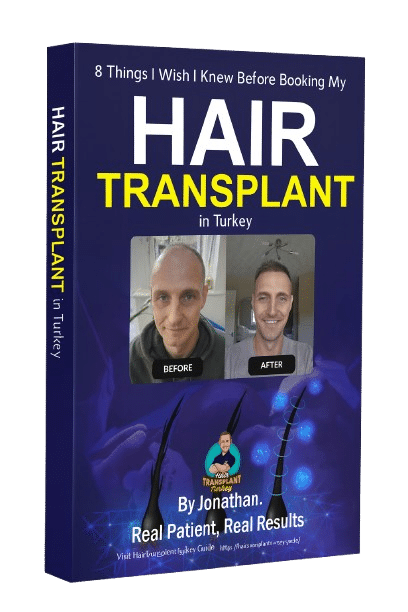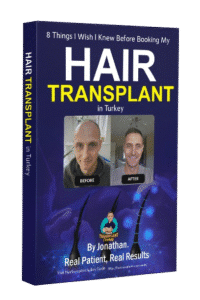When you’ve invested in a hair transplant, you naturally want the best possible results. The surgery itself gives your new follicles a chance — but what happens afterward makes all the difference.
After my own hair transplant with Clinicana Hair Transplant & Esthetic Surgeries in Istanbul, I quickly learned that recovery isn’t just about resting. It’s about giving your body (and scalp) the right tools — through nutrition, supplements, and lifestyle choices — to help those new grafts thrive.
In this article, I’ll share everything I did (and wish I’d known sooner) about supporting hair regrowth from the inside out — along with what Clinicana themselves recommend and what the science says.
Why Nutrition and Lifestyle Matter After a Hair Transplant
Even though a transplant physically moves healthy follicles to balding areas, the success of those follicles depends on what you do afterward. According to the Mayo Clinic, anywhere from 10–80% of transplanted hair grows back within 3–4 months — but your nutrition, hydration, and overall health have a major impact on that outcome.
When I finished my procedure at Clinicana, they explained the importance of maintaining a nutrient-rich diet and avoiding stress or smoking. I followed their advice closely, and I’m convinced it played a big part in my strong early growth.
Clinicana also offers a high-quality post-transplant supplement pack, specifically formulated for hair recovery. It’s an optional extra, but in my opinion, it’s worth every penny. It contains essential nutrients like biotin, zinc, and vitamin D — everything your scalp needs in one convenient product. For those not purchasing it, I’ll cover alternative options below.
Next, let’s look at the key nutrients your new hair depends on.
The Role of Vitamins and Minerals in Hair Regrowth
Different vitamins play different roles in how fast and strong your hair grows — and after a transplant, these nutrients become even more critical.
Biotin (Vitamin B7)
Biotin helps produce keratin — the main protein that makes up hair. Studies in PubMed show it supports hair strength and growth, especially when levels are low.
Clinicana’s supplement included biotin, but even before that, I took a 5000 mcg daily dose for six months and noticed visible improvement by month three.
Zinc
Zinc aids tissue repair and helps your scalp heal after surgery. According to the NIH, deficiency can contribute to thinning and shedding. Just be cautious — too much zinc can block copper absorption, so balance is key.
Iron and Ferritin
Low iron or ferritin is a common hidden cause of hair loss. It affects oxygen delivery to follicles, slowing down growth. I had my blood levels checked post-surgery and made sure to eat iron-rich foods like spinach, lentils, and red meat.
The Journal of the American Academy of Dermatology highlights the strong link between iron deficiency and hair shedding — something worth testing if your regrowth seems slow.
Vitamin D
Vitamin D regulates the hair follicle growth cycle. Since my transplant took place in Istanbul’s winter, I added a daily D3 supplement and noticed my scalp felt healthier and less dry.
See Harvard Health’s findings on vitamin D’s role in hair growth.
Vitamins E and C
Both are antioxidants that help protect newly implanted follicles from oxidative stress — the kind caused by inflammation and free radicals. Clinicana advised me to eat antioxidant-rich foods like berries, citrus, and nuts to support healing.
Here’s a short video on the best supplements for hair growth:
The Best Foods to Eat for Hair Growth and Scalp Health
During recovery, I treated my diet almost like a prescription — fuelling my follicles the same way an athlete fuels their muscles.
Protein-Rich Foods
Hair is 95% keratin, so without enough protein, your follicles struggle to grow. I made sure every meal included lean protein — chicken, eggs, fish, tofu, or Greek yogurt.
(Protein intake → increases → keratin synthesis)
Omega-3 Fatty Acids
Healthy fats improve blood circulation and reduce inflammation. A PubMed study found omega-3s also help nourish the scalp and reduce hair shedding. I ate salmon twice a week and took fish oil capsules daily.
Hydration
Hydration helps transport nutrients to your scalp and keeps your grafts hydrated during early healing. Clinicana’s team recommended at least 2 litres of water a day and avoiding caffeine for the first week.
Anti-Inflammatory Foods
Turmeric, berries, leafy greens, and green tea all help calm the scalp and promote better recovery. Remember, a mild inflammation is normal — but excessive inflammation slows healing and affects grafts.
Supplements I Personally Used After My Clinicana Transplant
Clinicana’s optional post-transplant supplement pack is one of the best I’ve come across. It’s formulated for hair recovery and includes biotin, zinc, vitamin D, and omega-3 — all in the right balance. For convenience and peace of mind, it’s worth adding to your package.
For comparison, here’s what I personally took during my recovery:
| Supplement | Duration | Why I Used It | My Results |
|---|---|---|---|
| Clinicana supplement pack | 6 months | Convenient all-in-one with biotin, zinc & D3 | Supported early density & faster growth |
| Biotin 5000 mcg | 6 months | Boost keratin & follicle strength | Noticeable thickening by month 3 |
| Zinc 15 mg | 3 months | Support tissue healing | Reduced scalp irritation |
| Vitamin D3 | 6 months | Compensate for low sunlight | Scalp health improved |
| Fish Oil (Omega-3) | 3 months | Anti-inflammatory | Reduced tightness around donor area |
Always check with your doctor before taking any supplements — especially if you’re already on medication or have specific health conditions.
Lifestyle Habits That Accelerate Hair Growth
Supplements and diet can only do so much if your daily habits aren’t supporting recovery. These small changes made a big difference for me.
Sleep and Recovery
Deep sleep is when the body releases growth hormone — essential for cell repair and hair regeneration. After my surgery, I focused on quality sleep at the Naz City Hotel Taksim (included in Clinicana’s package), and I honestly felt more energetic every morning.
The Sleep Foundation confirms that deep sleep directly contributes to tissue repair.
Exercise and Blood Flow
Light walking promotes circulation without raising blood pressure around the scalp. Clinicana advised me to avoid gym workouts for two weeks, and I followed that exactly. (Moderate activity → enhances → oxygen delivery to follicles)
Stress Reduction
Stress increases cortisol, which can disrupt the hair growth cycle. I found daily walks and a few minutes of breathing exercises helpful.
The American Psychological Association notes that chronic stress can trigger shedding.
Avoiding Alcohol and Smoking
Both impair wound healing and restrict blood flow — two things you absolutely want to avoid post-op. Clinicana was clear about this, and I stayed completely smoke- and alcohol-free for the first fortnight.
See NIH findings on smoking and wound healing.
Common Mistakes to Avoid
Many people take the wrong approach after surgery, thinking that more pills equal faster results. In reality:
- Over-supplementing (especially with fat-soluble vitamins like A, D, E, K) can be harmful.
- Relying on tablets without improving your diet limits progress.
- Expecting instant results leads to frustration — remember, hair grows in cycles.
- Buying cheap, unverified supplements online risks contamination or imbalance.
Consistency, patience, and moderation are key. I noticed my best progress between months 3–7 when I was consistent with both nutrition and sleep.
How Long Until You See Results?
Hair growth takes time — even when everything goes right. Typically:
- 3–4 months: New hairs start sprouting.
- 6–7 months: Density noticeably improves (my personal experience).
- 9–12 months: Final results and full texture appear.
These timelines match Mayo Clinic’s estimates and Clinicana’s guidance.
Final Thoughts – How I Support My Hair Every Day
A successful transplant is part science, part self-care. Clinicana gave me a strong medical foundation — but I found that what I did afterward made all the difference. Eating right, sleeping well, staying patient, and taking high-quality supplements transformed not just my hair, but my confidence.
If you’re planning or recovering from a hair transplant, remember: you’ve invested in yourself — now give your new hair the best possible start.
For more of my honest advice, videos, and before/after photos from my own Clinicana journey, you can get my free guide “8 Things I Wish I Knew Before Booking My Hair Transplant in Turkey” here:
👉 https://hairtransplantturkey.guide/



 Continue with Google
Continue with Google